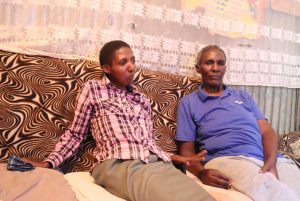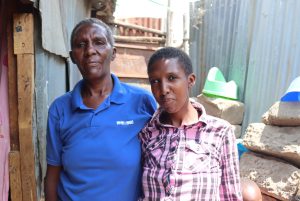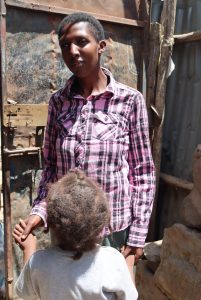Empowering Safe Spaces: Promoting Access to SRHR Information
 05 June 2023
05 June 2023

At the heart of Mukuru kwa Njenga informal settlement in Nairobi, we meet Pauline Mwihaki, diligently performing her household chores. Pauline is a devoted mother to Mary Wangui, a youth with a disability, and a right holder under the Make Way Programme.
During our visit, Pauline expresses her anguish over the immense challenges she has faced in supporting her daughter with cerebral palsy to access education due to the absence of accessible schools near the slums. She shares the arduous routine of accompanying her daughter to school for 14 years, every morning, ensuring she completes her primary education.
“Every morning, I would hold her hand and walk with her to the school, which is about three kilometers away from our home. We used to leave home at 6:30 am and due to my daughter’s mobility challenges, we had to walk slowly, arriving at school by 7:30 am. I still accompany her to safe spaces and anywhere that appears unsafe” said Pauline.

As a single mother, Pauline acknowledges the tremendous difficulties of raising a child with a disability without adequate support. However, her daughter, who also has a learning disability, received support from a generous benefactor to learn mat-making. After five years of study, Mary, herself, can now make mats and sell them. During our visit, Pauline joyfully shares how her daughter’s behavior has transformed since she joined a safe space specifically created for youth with disabilities, under the auspices of the Make Way Programme funded by the Ministry of Dutch Foreign Affairs(MoFA).
Mary expresses her enjoyment in attending the safe space meetings organized by the Action Network for the Disabled, a collaborating partner of Cheshire Disability Services Kenya and Liliane Foundation. She appreciates the opportunity to interact, learn, and share with her peers on various important topics, such as contraceptives, menstrual hygiene, relationships, maternal health, gender-based violence (GBV), and other Sexual and Reproductive Health and Rights (SRHR) issues.

“I have learned about GBV and where to report in case of any violation. In the safe space, I feel free and comfortable with my friends, and I now have the confidence to speak up and defend myself if someone tries to touch me inappropriately. I also know that I can seek their support whenever needed,” said Mary.
Pauline acknowledges the positive changes in her daughter’s behavior and notes that her social skills have improved significantly through the learning and sharing experiences in the safe space. She further adds that the knowledge gained about Menstrual Hygiene and Management has been crucial for Mary’s personal growth.
“Previously, Mary used to interact harshly with her younger siblings and nephews, but that has completely changed. Her personal hygiene has also improved as a result of the teachings on menstrual hygiene and management,” shared Pauline.



